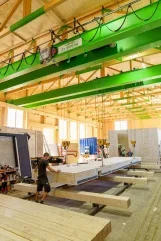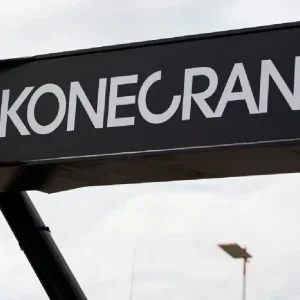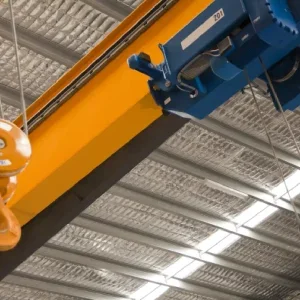
Demag has partnered with LiWooD modular housing after the company contacted its certified partner Liebl Kranbau in Ostfildern, near Stuttgart, asking for a crane runway and overhead travelling crane to carry components across a ‘pop-up’ production facility.
Liebl Kranbau built the cranes, including Demag components and rope hoists, to handle some of the large building elements. Since then, it has supported LiWooD in dismantling and assembling the cranes from site to site.
When LiWooD, based in Munich starts a construction project – usually a multi-storey residential building – a hall made entirely of wood is built from prefabricated materials in the immediate vicinity of the construction site.
This hall houses the production line, which receives individual parts and builds them into wooden units and entire rooms on site. Indoor cranes provide support during assembly.
The industrial and modular design ensures rapid construction and increases the quality of the process and resulting structures.
LiWooD employees assemble the modules into residential units in a flow production facility. The field factory creates up to 120m² of living space per day. A module is transported from one assembly station to the next on rails.
The individual components such as the bathroom, exterior and interior walls, windows and doors are removed from truck trailers positioned at the sides, placed on the floor module and fastened. Two overhead cranes on a shared crane runway take care of transport to the production line.
Liebl designed and built two double-girder overhead cranes with a span of 19.44 metres, which travel on a shared 47-metre long crane runway. Demag DRS-M 160 wheel blocks are combined with Demag offset geared brake motors and Demag ZBF90 drives to form a compact and powerful drive unit.
Both the travel speed of the two cranes and the lifting speed of the four Demag rope hoists, each with a load capacity of 5 tons and a hook path of 6 metres, are adjustable to enable precise positioning of the large-format timber modules. This means the hoist can be lifted and lowered in a range of 0.7 to 4 m/min.
As a rule, the rope hoists hold the components in position until LiWooD employees have connected them to the adjacent components. The holding brakes and prevention of the load from dropping are just as important as the travel drives. Another safety feature is the overload protection that the hoists are equipped with.
The crane experts at Liebl Kranbau are responsible for the correct assembly and disassembly of the crane.






